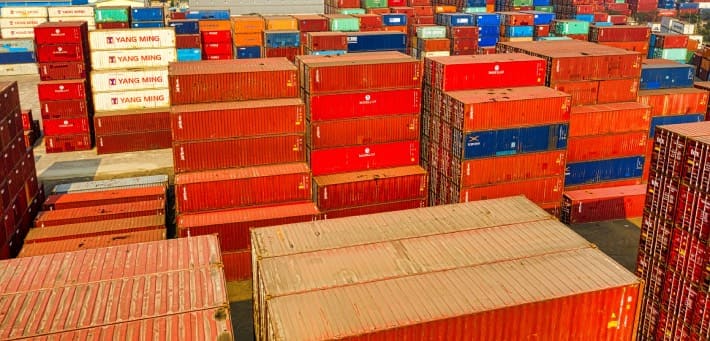SHANGHAI COVID BLOCKADE THREATENS FURTHER EXPORT DELAYS
SHANGHAI COVID BLOCKADE THREATENS FURTHER EXPORT DELAYS
SHANGHAI COVID BLOCKADE THREATENS FURTHER EXPORT DELAYS

Almost a third of the goods leaving the Shanghai port have been blocked due to a severe COVID blockade. The delays are bound to exacerbate a supply chain crisis that has caused shortages and price spikes around the world.
An economist from the Kiel Institute for the World Economy (IfW-Kiel) warned that Europe and the United States can expect greater delays in imports and shortages of electronics from China due to the COVID blockade at the Shanghai commercial hub.
Vincent Stamer, a world trade expert, told DW that exports from the world's largest container port in Shanghai fell by nearly a third.
"Three weeks after the start of the blockade, about 30% of the goods that are supposed to leave Shanghai right now are not," he explained. "In other words, that's 30% fewer exports to the rest of the world."
Shanghai exports in limbo
Stamer tweeted a chart showing that cargo volumes departing from Shanghai have dropped dramatically, while volumes from other Chinese ports have remained flat. Other port data shows that the average daily volumes of 140,000 containers have dropped to 100,000 per day.
Shanghai is the hotspot for China's largest wave of COVID-19 since the start of the pandemic more than two years ago. With a population of 26 million, the port city has been in a severe lockdown since March 28 that has forced some workers to sleep in its factories.
Delays in consumer electronics
Factories in the region around Shanghai specialize in exporting consumer goods such as tablets and televisions, as well as intermediate and more sophisticated electronic goods used for manufacturing in the West. "It appears that production has slowed down in the Shanghai region and that the products have not arrived at the port to be loaded onto container ships," Stamer said.
Shipping delays increased despite assurances from Chinese officials that port operations would be minimally affected by the restrictions.
Pictures posted on social media by sources such as Marine Traffic showed the extent of the delays, with dozens of ships anchored in Shanghai waters, with no cargo to load.
Stamer said the delays will be felt in Europe in about two months, as container ships take 5-6 weeks to travel from Shanghai to North Germany's Port of Hamburg and another two weeks to unload and deliver goods.
Further delays will fuel inflation
Stamer predicted that consumer goods would become more expensive this summer, adding that Germany could be among the hardest hit by the delays, with nearly a third of maritime trade between China and Europe's largest economy shipped from the port of Shanghai. . Between 5% and 8% of trade between the two nations is currently lagging behind, he said.
Germany's economic representative to China, Maximilian Butek, backed the prediction, telling news agency dpa on Friday that alternative delivery routes through other ports weren't enough to cushion the loss.
Butek agreed that the port of Shanghai itself was not the main concern, as the real delays were due to the transport of goods from the factories to the port.
Supply chains are already struggling
The new delays are sure to exacerbate a supply chain crisis that has grown from the height of the first COVID blockades around the world in the spring of 2020.
The pandemic initially forced much of the global economy to close, forcing shipping companies to cancel shipping programs. This, in turn, has left dozens of container ships anchored off the coasts of Western and Chinese ports, often in the wrong place.
As a result, more than three-quarters of the world's ports have experienced abnormally long response times over the past two years, according to Bloomberg.
Last year, the closure of two other Chinese ports, Ningbo-Zhoushan and Yantian, also worsened the production and retail shortage in the rest of the world.
As a result, the German economy grew by only 2.7% in 2021, instead of the 4.7% forecast. Inflation also peaked in nearly 30 years. Describing the global picture, Stamer told DW that about 12% of all cargo moving around the world in containers is currently stuck on ships that don't move. The normal rate is below 6%, while the highest rate ever recorded was 14% at the end of summer 2021.
Loosened confinement restrictions in Shanghai
On Friday, the Shanghai authorities promised to ease virus checks on truckers hindering their deliveries. The Associated Press quoted Deputy Mayor Zhang Wei as saying the region was making "every effort" to resolve the crisis.
Truckers hauling goods to Shanghai have been faced with multiple checkpoints and virus tests that have forced some shipping companies and drivers to avoid the region altogether. The lockdown is now slowly loosening and a new, simpler testing regime will facilitate the passage of drivers arriving at the port, said Wu Chungeng, director of the Road Office of the Ministry of Transportation.
No quick fix
"My gut feeling is that the delays might get a little worse before they get better," Stamer cautioned however. He predicted that global supply chains "will not return to normal this calendar year" because bottlenecks in transportation and ports are difficult to resolve.
"We should see some relaxation in the next 12 months, but only if further blockages in China can be avoided," added Stamer.
The Chinese leadership has followed a rigorous Zero-Covid strategy that includes curfews, mass testing, and quarantine requirements since the virus emerged in Wuhan in late 2019. This approach has been challenged by the arrival of the omicron BA.2 virus sub-variant and the fact that vaccines from China are not as effective as those produced in the United States and Europe.


